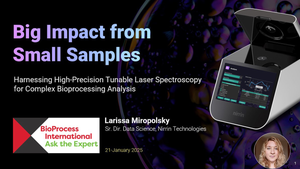
Pluri, BIRAD bring tumor-fighting MAIT cells to commercial viabilityPluri, BIRAD bring tumor-fighting MAIT cells to commercial viability
Pluri has collaborated with Bar-Ilan University to develop placental mucosal associated invariant (MAIT) T-cells for solid tumors. We spoke to the company’s spokesperson to find out more.

Funded by the Israel Innovation Authority (IIA), Pluri and Bar-Ilan University Research and Development (BIRAD) will use Pluri’s MAIT cell-therapy platform to advance the cell’s efficacy.
Cyrille Cohen, head of the tumor immunology and immunotherapy laboratory at Bar-Ilan University, will lead the project and oversee the integration of chimeric switch receptors (CSRs) with the lab’s cell therapy platform.
According to the firm, MAIT cells have advantages over conventional T-cells, but are difficult to expand and scale for clinical investigation and commercialization. This partnership aims to address that issue using the lab’s MAIT cell platform to develop clinically optimized T-cell genetic modification vectors.
A spokesperson for Pluri told BioProcess Insider about the partnership, the platform, and MAIT T-cell manufacturing.
BioProcess Insider (BPI): Could you provide an overview of Pluri’s proprietary MAIT cell expansion platform and what challenges it addresses in immunotherapy?
Spokesperson (SP): Pluri has overcome a key challenge in immunotherapy production using its 3D cell expansion technology. With modular bioreactors and 3D manufacturing of placenta-based cells, Pluri has developed a manufacturing process with numerous capabilities. It creates a ready-to-use product that does not require special clinics or patient-tailored production (no bridging period). It reduces the high production cost and complex manufacturing process associated with autologous products. And it provides a scalable off-the-shelf product with batch-to-batch consistency.
BPI: How do Pluri's MAIT cell therapies differ from traditional T-cell immunotherapies?
SP: Pluri’s MAIT cells are isolated from the human placenta, a source rich in highly potent allogeneic immune cells. These cells are potent effector cells, potentially targeting tumors through multiple mechanisms while expressing high levels of various chemokine receptors, which facilitate their migration directly to tumor sites.
Unlike conventional T cells, Pluri’s MAIT cells minimize the likelihood of graft versus host disease (GvHD), a serious complication associated with other potential allogeneic products.
BPI: What are the potential market implications if CAR-MAIT cell therapy successfully addresses solid tumors?
SP: Chimeric antigen receptor (CAR-T) immunotherapy has shown monumental success in treating hematological malignancies, with the FDA approving six autologous CAR-T cell therapies to date. Despite revolutionary progress in hematological malignancies, equivalent success has yet to be duplicated in solid tumor malignancies which present unique challenges. The global cancer immunotherapy market was valued at $111 billion in 2023 and is expected to surpass $312 billion by 2033.
Solid tumors are a significant medical need, as a unique immune cell is needed to overcome conventional T cell disadvantages and successfully reach the desired site and infiltrate the tumor. We believe that Pluri’s MAIT cells enable the CAR to reach the tumor, potentially leading to better migration, infiltration, and efficacy. We look forward to sharing future research results.
BPI: What is the expected timeline for moving from the development phase into preclinical studies, and what milestones do the partnership aim to achieve during this period?
SP: This project was designed to effectively develop a new product based on Cohen’s technology and Pluri will start preclinical work soon. In the first year, we will conduct comprehensive studies to create the best-integrated product through in vitro testing, ensuring the design is optimized. Once we achieve the ideal product, in vivo pre-clinical studies are planned for the second year.
BPI: How is IIA supporting this collaboration, and what criteria will determine the option for a second year of funding?
SP: The IIA will fund the collaboration through a grant to support breakthrough products that are being developed in collaboration between a research institution and a corporation. Second year funding will be determined after successfully meeting our predefined milestones.
About the Author
You May Also Like







